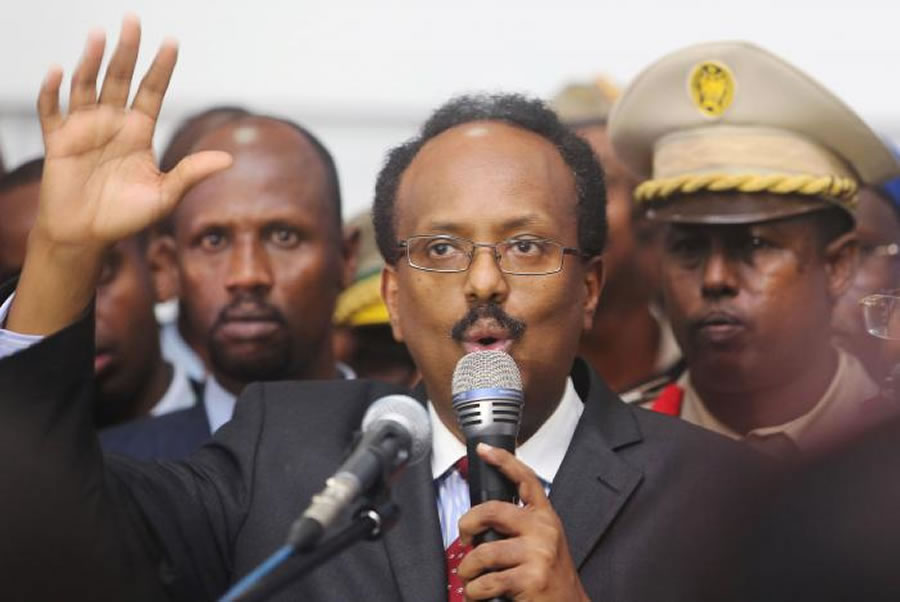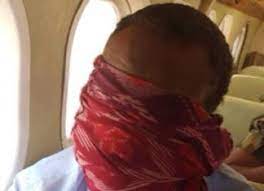BY Faisal A. Roble

On February 8, 2017, Somalis all over the globe expressed their hopes in the election of Mohamed Abdullahi Farmajo. He succeeded former President Hassan Sheikh Mohamoud as the fifth president in the era of post Carta Peace Convention of 2000.
“Farmajo Iigeeya,” or “take me to Farmajo” became a spur-of-the-moment national slogan on the eve of February 8, 2017. It was globally televised. Unlike Gil Scott Herron’s “revolution will not be televised” of the 1960 civil-rights era in the US, Farmajo’s hope-laden change was indeed televised.
This powerful message was driven home for a maximum impact by an iconic image of a destitute young Somali-Bantu man emotionally screaming “Farmajo Iigeeya!” Some saw in this image the end of an era of misery, poverty, and lawlessness.
To the dismay of millions of Somalis, those words were abused by the very man for whom the bell rang. Following his infantile move to select an unimpressive cabinet, his visionless, mediocre communication skills, and his subsequent pedestrian approach to complex issues were all early signs of a wrong direction that country took.
Only 30 days into his term, on March 20, 2017, I wrote an article titled “Farmajo: The Saga of Missed Opportunity.”Here is my concluding remarks of that article:
“On February 8, 2017, president Farmajo was given the one powerful tool, political mandate, to … rebuild Somalia afresh. Unfortunately, he failed to harness such an immense political capital and instead gravitate back to the hell hole that he felt comfortable. Unless he changes course, which is unlikely, his legitimacy and the short-lived mandate he had until recently may not come back to him.
Since then, I have watched the country drifting farther to the abyss. Of course, some relative improvements over previous years have been achieved. A case in point is the establishment of a small elite but mighty military contingent. That would have been celebrated had he not used it to terrorize oppositon leader and suppress popular sentiments.
In the upcoming days, campaign rhetorics will intensify. Farmajo’s side will explain its gains. As stipulated in these words by his campaign team, “ “The ongoing transformation under the leadership of President Farmajo is leading the country in strengthening government institutions, strengthening security, economic reform, political, domestic and foreign affairs, and all social development for four years.” Without real data or concrete examples, these claims remain a wishful thinking and a mere propaganda.
Farmajo’s critics will blame him and may cite many factors that could become the basis for the freshly seated legislatures to deny him a second term.
- The Qalbi Dhagax factor: On August 23, 2017, President Farmajo handed over Abdikarim Sheikh alias Qalbi Dhagax, to Ethiopia. Farmajo also designated the Ogaden national Liberation Front (ONLF) a “terrorist organization.” At the time he was currying favor from the TPLF dominated EPRDF government in Ethiopia.
The culprits in this heinous mission of violating the human rights of a Somali citizen were Prime Minister Hassan Khayre and their spymaster, San Balooshi, who had admitted that he was under the order of his bosses.

In October 2017, only months after Qalbidhagax was handed over, I happened to meet with president Farmajo along with 10 other Somali intellectuals. I asked him why he handed over a Somali citizen to Ethiopia. He had then sheepishly admitted he made a mistake. Qalbi-dhagax was the first Somali citizen, whether in a movement or not, handed over to Ethiopia or elsewhere by a sitting National government of Somalia. With this debacle, legislators may not be to align this move by Farmajo with his claimed patriotism as depicted by the hanging of the picture of Somalia’s founding father, Adan Abdulle Osman – a representation of mischief which remained unabated in his entire five years in office.
- The Dictatorial tendencies and attack on opposition leaders are another factor. Since Somalia achieved a semblance of political reconciliation following the Carte Convention in Djibouti in 2000, no leader in Villa Somalia attacked the opposition violently. Abdirahman Abdishaku’r’s base was obliterated and some of his guards were murdered. Even former presidents such as Hassan Sheikh Mohamoud and Ahmed Sheikh Sharif were attacked. Senior senators such as Muse Sudi Yallaxaw were also terrorized and attacked by the army. Some saw in Farmajo traits of an autocrat. And that fear may not be lost to the legislature that would elect a president on May 15, 2022
- National treason: Some may not vote for President Farmajo for his subsidiary role to Ethiopia and Eritrea, while relegating Djibouti. Many legislators could raise the question of why Farmajo sent young Somali soldiers intended to fight Alshabab to Ethiopia’s civil war. Moreover, he did not consult neither the parliament nor his cabinet. Equally worrisome is Issaias Afworke’s influence in Somalia. Somalia wants neither a dictator nor to get on the wrong side of the Western World. It is the West that practically sustains Somalia; and Farmajo risked this collaboration of the two. Add to this the reported agreement between Farmajo and Abiy Ahmed of Ethiopia on unification talks and the selling of the Somali sea to Ethiopia.The perpetuation of conflict in Gedo is a national disgrace that he could have arrested.
- Al Shabab factor: despite the upgrading of the Somali national army, Al Shabaab still controls large areas in Southern Somalia, primarily in Galmudug, Hirshabeele, Southwest, and Jubbaland. As if that was not enough indication of a security sector failure, Al Shabaab is a deep state inside Mogadishu where it collects taxes on business from to the port of Mogadishu. It even collects commission from construction projects. It plays the role of municipal government in large parts of Jubbaland and Southwest and elsewhere.
Whether one thinks that Mohamed Abdullahi Farmajo was the unknown dark horse in the 2017 presidential election is not an excuse in 2022.
If Somalis want to foster a modern nation state, they need not create excuses for the failure of their leaders. They should be adult enough to select their leader on the basis of vision, honesty, loyalty to the Somali concept created by its founders, and commitment to re-imagining. Whoever wins this often abused seat will be watched by the eyes of hungry and angry 0ver 25 million Somalis around the globe.
Faisal A. Roble
Email: [email protected]
———–
Faisal Roble, a writer, political analyst and a former Editor-in-Chief of WardheerNews, is mainly interested in the Horn of Africa region. He is currently the Principal Planner for the City of Los Angeles in charge of Master Planning, Economic Development and Project Implementation Division.
We welcome the submission of all articles for possible publication on WardheerNews.com. WardheerNews will only consider articles sent exclusively. Please email your article today . Opinions expressed in this article are those of the author and do not necessarily reflect the views of WardheerNews.
WardheerNew’s tolerance platform is engaging with diversity of opinion, political ideology and self-expression. Tolerance is a necessary ingredient for creativity and civility.Tolerance fuels tenacity and audacity.
WardheerNews waxay tixgelin gaara siinaysaa maqaaladaha sida gaarka ah loogu soo diro ee aan lagu daabicin goobo kale. Maqaalkani wuxuu ka turjumayaa aragtida Qoraaga loomana fasiran karo tan WardheerNews.
Copyright © 2024 WardheerNews, All rights reserved


